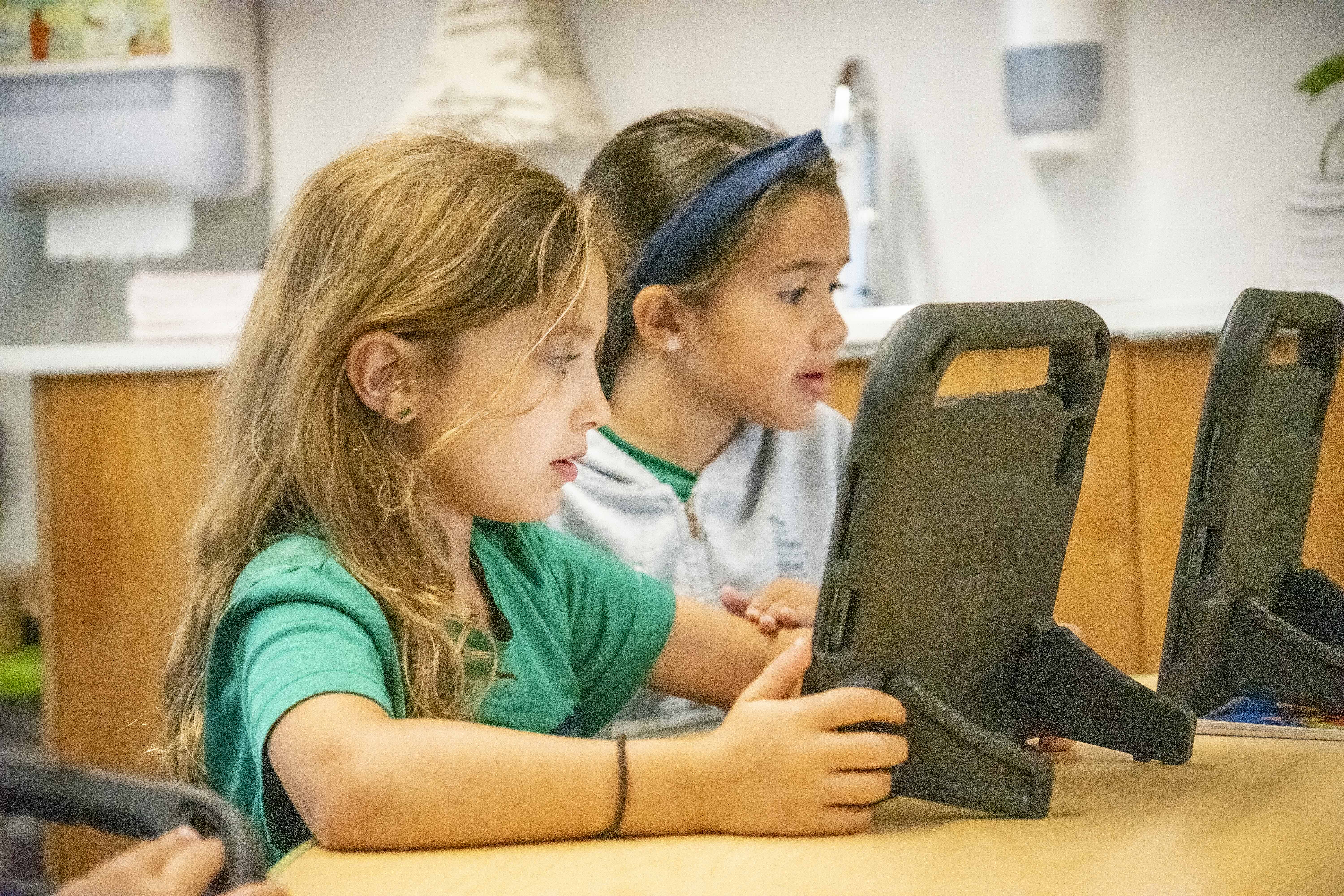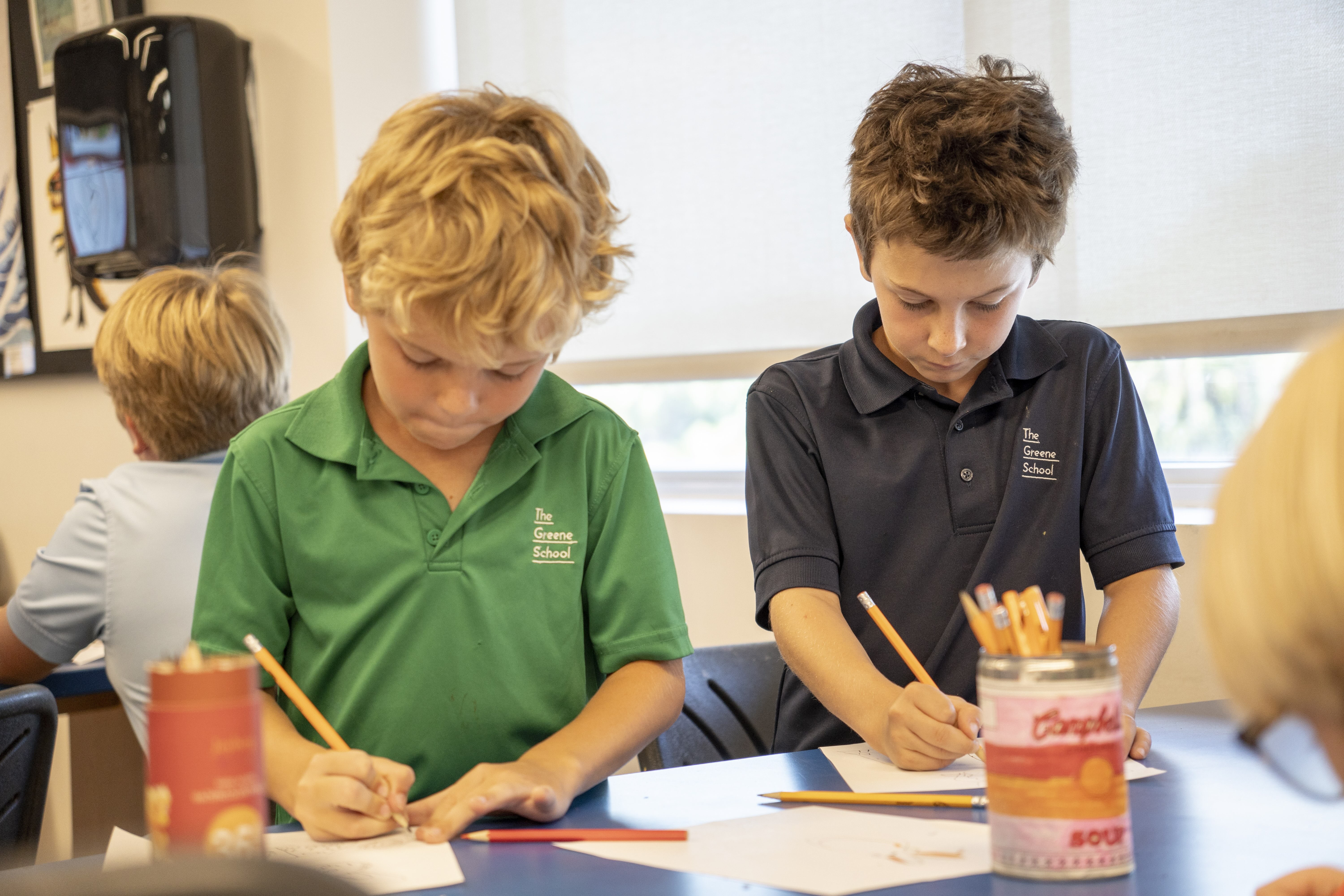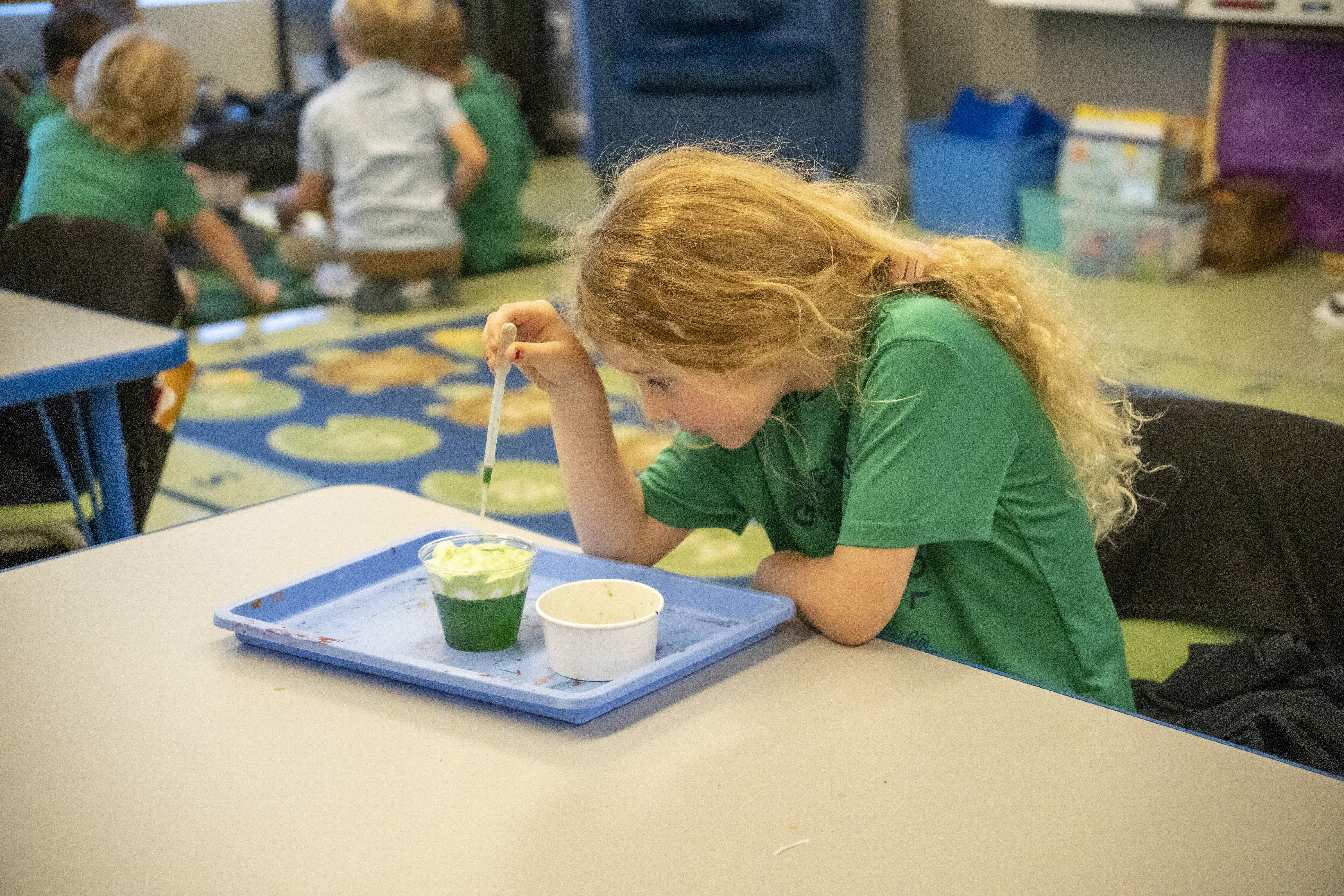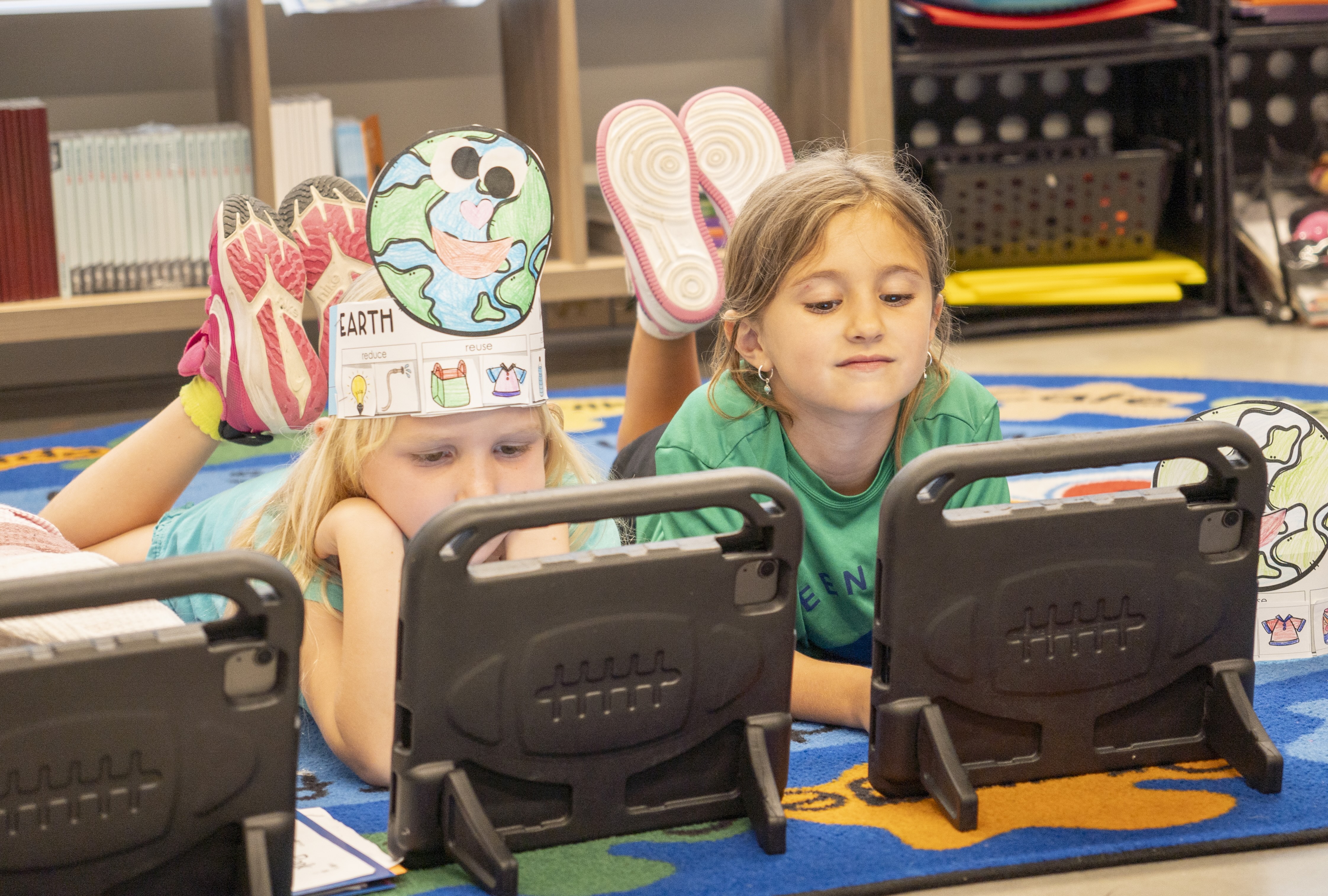
Every classroom from Early Childhood through Fifth Grade features two master-level teachers working collaboratively to create an exceptional learning environment. This co-teaching approach allows us to meet each student exactly where they are in their learning journey, providing intentional and purposeful differentiation that ensures every child is appropriately challenged and supported.
With two expert educators in each classroom, students benefit from:
- Individualized attention with a lower student-to-teacher ratio
- Diverse teaching styles that accommodate different learning preferences
- Real-time differentiation as teachers can simultaneously work with different groups or provide one-on-one support
- Enhanced curriculum delivery through collaborative planning and instruction
- Immediate intervention and enrichment opportunities as needs arise
This unique model ensures that whether a student needs additional support to master a concept or is ready for advanced challenges, their learning experience is tailored to their individual needs and growth trajectory.




At the Early Childhood level, we focus on building a love for language through storytelling, songs, and interactive experiences. Through rich classroom read-alouds, diverse literature, and student storytelling experiences, we cultivate a deep appreciation for the written word.
Key Skills:
- Phonemic awareness and letter recognition
- Vocabulary development through stories and songs
- Oral language through dramatic play and discussions
- Beginning writing through drawing, mark-making, and beginning letter formation
Mathematical thinking begins with hands-on exploration and discovery. Children engage with concepts of counting, number recognition, patterns, and basic shapes through manipulatives, games, and real-world experiences. We introduce measurement through cooking activities, sorting and classifying objects, and exploring spatial relationships during block play and puzzles.
Key Skills:
- Counting and number recognition
- Pattern identification and creation
- Basic shape recognition and spatial awareness
- Sorting, classifying, and beginning measurement
Young scientists explore the world around them through observation, questioning, and hands-on investigation. Our program includes nature walks, simple experiments, and exploration of living things. Children learn about weather, seasons, animals, and plants through direct experience and guided discovery, fostering natural curiosity about how things work.
Key Skills:
- Observation and questioning about the natural world
- Exploration of weather, seasons, and living things
- Simple experiments and hands-on investigation
- Beginning understanding of cause and effect
We help children understand their place in the world, beginning with family, classroom, and school community. Students learn about different cultures, traditions, and holidays while developing social skills like sharing, cooperation, and empathy. Geography concepts emerge through exploring our immediate environment and understanding basic concepts of home, neighborhood, and community helpers.
Key Skills:
- Understanding of family, classroom, and school community
- Exposure to different cultures and traditions
- Development of social skills and empathy
- Beginning geography concepts and community awareness
Students develop foundational reading skills through a balanced literacy approach combining phonics instruction, guided reading groups, and independent reading time. Alongside reading development, students craft written pieces ranging from personal narratives to informational texts.
Key Skills:
- Phonics instruction and guided reading
- Sentence structure and basic grammar
- Creative writing and self-expression
- Vocabulary building through literature
- Making text-to-self connections
Mathematical concepts become more structured while maintaining hands-on learning approaches, including projects that connect mathematical thinking to real-life experiences and everyday problem-solving.
Key Skills:
- Number sense and place value understanding
- Addition, subtraction, and beginning multiplication
- Problem-solving through word problems
- Geometry and measurement concepts
- Real-world mathematical applications
Students engage in more structured scientific inquiry while maintaining wonder and curiosity. Students learn to make predictions, conduct simple experiments, and record observations.
Key Skills:
- Scientific inquiry and observation skills
- Life science: habitats, life cycles, body systems
- Physical science: matter, simple machines, basic physics
- Making predictions and conducting experiments
Recording and analyzing observations
The social studies curriculum expands from community to country, introducing students to American symbols, holidays, and basic government concepts.
Key Skills:
- American symbols, holidays, and basic government
- Map skills and geographic awareness
- Introduction to historical figures and events
- Understanding cause and effect in history
- Community to country connections
Students become more sophisticated readers and writers, engaging with chapter books, poetry, and informational texts. Reading comprehension strategies are explicitly taught, including making inferences, identifying main ideas, and analyzing character development. Writing instruction includes narrative, informational, and opinion pieces with a focus on organization, voice, and conventions. Grammar and vocabulary instruction become more formal and systematic.
Key Skills:
- Advanced reading comprehension and analysis
- Narrative, informational, and opinion writingInference-making and character analysis
- Formal grammar and vocabulary instruction
- Organization, voice, and writing conventions
Mathematical thinking becomes more abstract while building on concrete foundations. Students make connections between mathematical concepts and everyday situations where these skills are applied.
Key Skills:
- Multi-digit operations and computational fluency
- Fractions, decimals, and basic algebraic thinking
- Multi-step problem solving and real-world applications
- Advanced geometry: area, perimeter, 3D shapes
- Introduction to data analysis and probability
Students engage in more sophisticated scientific practices, including hypothesis formation, controlled experiments, and data analysis. Hands-on learning experiences include designing and conducting extended investigations, collecting and interpreting data over time, and collaborating on scientific projects that mirror real scientific work. These experiences provide a greater understanding of concepts while developing students' ability to think and work like scientists.Students engage in more structured scientific inquiry while maintaining wonder and curiosity. Students learn to make predictions, conduct simple experiments, and record observations.
Key Skills:
- Hypothesis formation and controlled experiments
- Earth science: weather systems, geology, astronomy
- Life science: ecosystems, adaptation, body systems
- Physical science: energy, motion, molecular matter
- Data collection, analysis, and scientific reasoning
The curriculum covers American history from exploration through modern times, encouraging students to think critically about historical events and analyze their lasting impact on our world today.
Key Skills:
- American history from exploration to modern times
- Advanced geography and global awareness
- Critical thinking about historical events and their impact
- Democratic principles and civic responsibilities
- Government structure at the local, state, and national levels